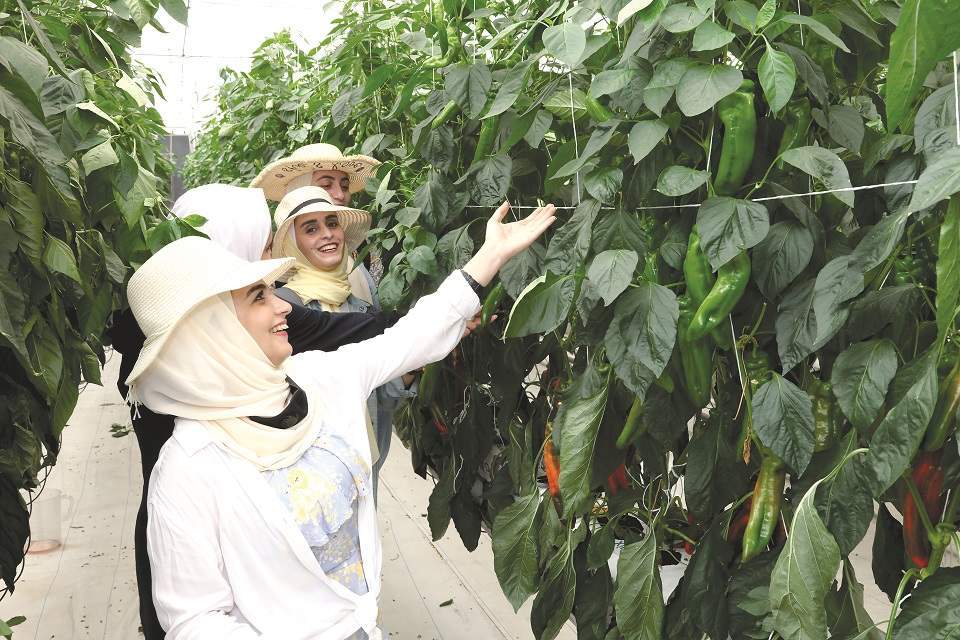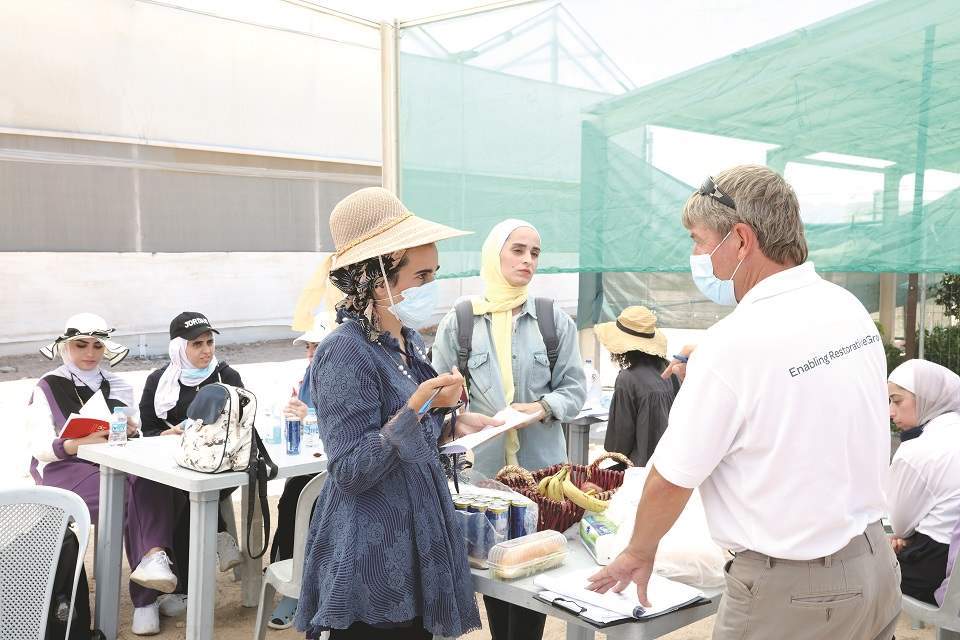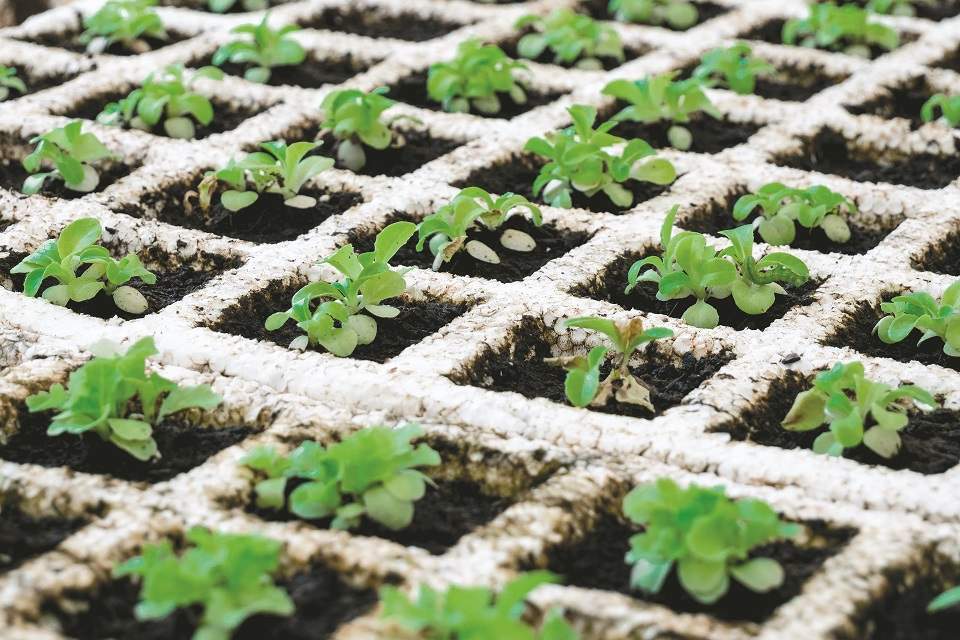AMMAN — In an unsuspecting part of the dry
Wadi Araba landscape, a small but ambitious climate project is making strides in the Kingdom.
اضافة اعلان
Sahara Forest Project’s Launch Station, established in the
Aqaba area in 2017, is a test and research center growing crops all year round, using only solar power and salt water from the
Red Sea.
The operation’s aim is bold: to address food insecurity, climate challenges, unemployment, and women’s access to the job market, all in one fell sweep.
 (Photos: Handouts from Sahara Forest Project Foundation)
(Photos: Handouts from Sahara Forest Project Foundation)
At the site, tall date palms and acacia thorn trees offer welcome shade, while pots of herbs withstand the strong winds and blazing south Jordan sun.
Inside the greenhouses are rows of eggplant and pepper plants with lush green leaves.
Blaise Jowett, Sahara Forest Project’s head grower, explained to
Jordan News how these crops are essential to establishing a sustainable cycle and to improving the microclimate in the area, by means of composting and shading.
“As you build up your organic matter, your plants will grow, there’ll be shading … it becomes a better environment, really in a microclimate,” he said.
Describing their technical process, Jowett detailed how salt water from the Red Sea is transported to the location before being converted onsite into fresh water to irrigate the crops.
The remaining salty brine feeds into a cooling system to bring the temperature down in the greenhouses: “the brine goes through the cooling, and … at 13 percent (salinity) we pump it out into the ponds.
The sun does the rest and makes salt.”
 (Photos: Handouts from Sahara Forest Project Foundation)
(Photos: Handouts from Sahara Forest Project Foundation)
According to a 2021 report by
UNICEF, Jordan is the second most water scarce country in the world, meaning that innovative solutions to water insecurity and related food insecurity are particularly pertinent in the Kingdom.
However, Ruba Al-Zubi, strategic advisor for
Sahara Forest Project, claims that Jordan is “very late” for this. In an interview with
Jordan News, she explained that there are still very few solutions to issues of water scarcity and the effects of climate change in the Kingdom, despite widespread public awareness.
“We have to find solutions for desalination and for waste water reuse,” she said. “And we’re still not doing much on that, actually nothing almost.”
Zubi added that, while Jordan’s greenhouse gas emissions are low, the country is “very much impacted” by climate change. Because of this, she emphasized the need for adaptations and solutions such as that of the project: “we need to adapt, and become more resilient, and think of innovation as a tool … whether it is for agriculture, water, anything.”
According to data from the
World Bank, Jordan’s greenhouse gas emissions, standing at 2.5 metric tons per capita in 2018, are significantly lower than other countries in the region, and amount to a global share of just 0.06 percent.
 (Photos: Handouts from Sahara Forest Project Foundation)
(Photos: Handouts from Sahara Forest Project Foundation)
“Jordan knew that we have to move on our own,” Zubi said of the project. “What we’re showing is that desalination or salt water can be a backbone for many other sectors, and agriculture is one of them.”
Funded by the Norwegian government and the European Union, and facilitated by Aqaba Development Corporation, the development arm of the
Aqaba Special Economic Zone (ASEZA), Sahara Forest Project’s pilot has strong national and international backing.
However, since news in March confirmed that the World Bank has withdrawn its support for the Red Sea-Dead Sea Water Conveyance project, Sahara Forest Project has had to rethink its infrastructure plans.
In place of the original pipeline, a new, smaller project is reportedly now in the planning stages.
Mohammad Al-Sakran, Executive Director for Transport and Logistics for the
Aqaba Development Corporation (ADC), told
Jordan News that a future pipeline “will bring the water from the Red Sea up to the (Sahara Forest Project) facility”, and will not only feed the one project, but will provide water for various other agricultural projects and fisheries in the area.
Sakran added that they are “trying to utilize Aqaba as land for all of Jordan”, with a focus on green projects, and those which can also benefit the community and economy, where the new pipeline will play a key role by offering seawater for desalination.
Sahara Forest Project has already been making steps to involve the community, with 30 female students recently graduating from their agritech training program, run in collaboration with Al Hussein Technical University.
According to Professor Ismael Al-Hinti, president of
Al-Hussein Technical University, women’s participation is one of the priorities for their upskilling courses, which both organizations hope to run again in the coming year.
“Women’s participation in the work force in Jordan has been remarkably low,” Hinti stated. “It is lower than other countries, even than other countries in the region. When it comes to agriculture, this becomes even more obvious.”
Data from the World Bank indicates that women make up just under 15 percent of the workforce in Jordan.
Hinti added that, for the agricultural students on the program, “there is a disconnect between what they have studied at the university … and the actual practice of agricultural technology.” He said that the training program they run with Sahara Forest Project aims to bridge this gap.
Heba Mustafa Almomani from Ajloun, one of the program’s recent graduates, said that the training was an “amazing opportunity” for her, particularly because it allowed her to put her technical knowledge to practical use.
A fellow student, Tayma Hashem Abu Ayyash from Amman added that she learned a lot from the program and wants to be “one of the women who takes action in leadership” in the agricultural sector.
For Zubi, Sahara Forest Project is a “success story” so far. She explained that she hopes to take the project to the
UN Climate Change Conference (COP26) in November this year, where they will showcase this “huge potential for Jordan”. Looking forward, she added that Sahara Forest Project plans to roll out its operations over further sites across the Kingdom in the next two to five years, implementing its sustainable model of agriculture for both people and the planet.
“Food security is not a luxury,” she said. “It’s a very important aspect (of life) that we have to worry about.”
“Nobody can compare this project to any other project in Jordan,” Zubi added. “This is Aqaba, and it can really become a good source of data, a good source of information, on how we can move forward on many things.”
Read more Lifestyle



